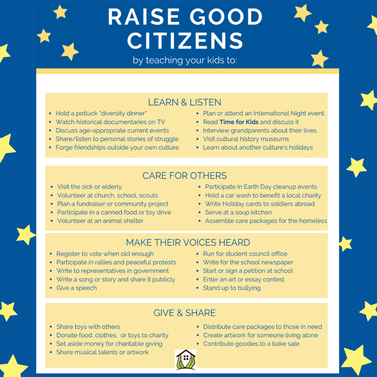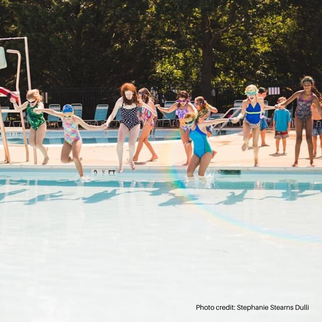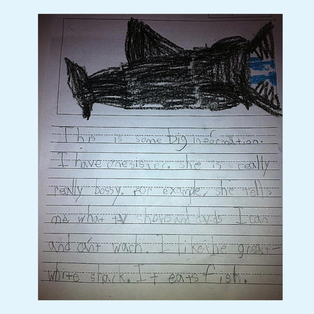 Download this PDF using the link in the last paragraph. Download this PDF using the link in the last paragraph. If you think about it, parenting is a huge responsibility to all of society. It's not enough just to keep your kids safe and loved, educate them, and help them transition into self-sufficiency. One of the most important, meaningful, and never-ending aspects of parenting is inspiring your offspring to make the world a better place and play a role in advancing the human race. As long as you are breathing, you are either taking from the world, or giving back to it. Teaching your child how to give back is one of the biggest ways you continue to give back. As most parents know, what you do has a greater impact on your kids than what you say. They will be watching as you teach by modeling learning...say something important by listening intently...receive fulfillment by giving away your time and treasure to a cause greater than yourself...and make your voice heard by amplifying the voices of others. This isn't difficult to do, but it doesn't just happen on its own. It requires intention. And it's never too early to start. Look for ways you and your children can listen and learn together. Show your kids that learning is a lifelong process. Explore the world beyond your own gate. Go to museums; read books; pay attention to current events; learn about history, religion and cultures outside of your own. Forge relationships with others from diverse backgrounds. Ask grandparents to share stories of their past experiences and personal struggles. All of this enables your children to put themselves in other people's shoes and develop an empathy and compassion that is crucial to improving the world for everyone. Model the behaviors you want your kids to emulate. Demonstrate what it means to be a good citizen. Take them with you to vote. Talk to them about the electoral process. Describe your volunteer work. Tell them about the causes you support and why you chose to make them a priority. Discuss age-appropriate current events at the dinner table. Invite friends and co-workers from diverse backgrounds to your home and visit them in theirs when invited. Introduce your children to food, customs, holidays and traditions from other cultures. Read the paper and educational magazines both in front of them and to them. Let them witness your continuing education about the world around you. Share with them about a time you changed your stance on an issue after listening to the other side's arguments. It's important for them to see that beliefs and priorities can evolve as you continue to learn and seek out new perspectives. Encourage them to get involved. Plan a summer project or field trip your family can do around giving back to the community. Participate in family-friendly volunteer events. Encourage them to give gifts that support a cause or to opt out of receiving gifts themselves and instead set up a fundraiser for a cause near to their hearts. Support them in a run for student council office. Enroll them in scouts, youth groups, or other organizations that center activities around serving others. Share with them what other kids are doing and nurture their creativity in finding ways they can offer their own unique skills and talents to the world. There's no shortage of examples, but here are just a few more of my favorites:
Every voice matters. Even the smallest effort can make the biggest difference to one person. Empower your children from a young age to become the change they wish to see in the world. Download and print out the Raise Good Citizens PDF to get started. With a little bit of contagious enthusiasm and the desire to keep learning, growing and contributing, even raising good citizens can be easy peasy.
0 Comments
 Quite a few years ago, when my kids were younger, I spent a much-overdue weekend away with my three older sisters. It was the first time I had ever been away from my children, then ages 7 and 9, for more than one night. I was sure they would miss me, and I knew I would miss them, but my son responded to the news of my impending trip with this elated proclamation to his father: “Hey Daddy, that means that we can do whatever we want all weekend, because Mommy won’t be here to boss us around!” Alas, it’s true that we all need to take a break every now and then from doing what we’re supposed to do. That’s why we take vacations or occasionally skip the gym...why we sometimes take a “mental health day” from work, or cheat on our diets. In this case, my son thought that with his drill sergeant mom on leave, there would be no one ordering him to clean up his toys, make his bed or clear his dishes. He envisioned my time away as one long boss-free, video-game-playing, TV-watching, Lego-dumping weekend filled with Cocoa Puffs for dinner, chocolate cake for dessert and no church or teeth-brushing to cramp his style. Except he forgot his sister would be staying home with him. Here’s how he described her at the time: It says: This is some big information. I have one sister. She is really bossy. For example, she tells me what TV shows and DVDs I can and ca'nt wach [sic] I like the great-white shark. It eats fish. (I wonder, are those blue things fish, or a bossy sister's feet? Hmmm...) Anyway, a little time off from the regular routine is both healthy and necessary, and summer is the ideal time for relaxing our standards and enjoying some easy, laid-back simplicity. But there is a fine line between a relaxed routine and a free-for-all that can be difficult to reverse. Just like enjoying that all-you-can-eat dessert buffet, the long-term negative effects of your binge can be minimized with just a smidgeon of advance preparation and a plan in place for easing back into the rigors of everyday life when reality resumes in the fall. Also remember that kids need a little structure in place to reassure them when they crash from that sugar rush. Here are just a few strategies that I have found make for a smoother transition back to reality when summer ends:
So go ahead, turn on Nat King Cole and turn up the volume as you savor the sweetness of these long summer days, but just remember that you still need to brush every day if you don’t want a cavity! With a little structure and routine over the summer, even transitioning your kids back to a school-time schedule in the fall will be easy peasy.  Are your kids learning the life skills they will need as adults? Are your kids learning the life skills they will need as adults? As a parent, one of your most important - and perhaps daunting - responsibilities is preparing your child for the day he leaves your nest. Believe it or not, that day will come much sooner than you think or will be ready for. When you first bring your little bundle of joy home for the first time, it seems as though you have all the time in the world. But there's so much knowledge to impart over the next 18-21 years. The good news is that the awesome task ahead of you will no doubt become one of the greatest and most rewarding adventures you will ever embark upon. Sharing your knowledge of the world and instructing your child in the life skills he will need as an adult presents a unique opportunity for bonding. Think back on your own childhood and I'll wager some of your fondest memories are the times you learned a new skill under the loving tutelage of your parents or grandparents. Learning to ride a bike with mom and dad cheering you on; standing on a kitchen chair to help stir the cookie dough; receiving driving instruction from your white-knuckled parent looking terrified in the passenger seat...these are shared moments of victory...of the successful transference of knowledge and skill from one generation to the next. These little successes form a foundation of confidence your child can build upon in the years ahead. Like your parents before you, you are your child's first and most effective teacher. Endless opportunities present themselves during the course of everyday life to teach him everything from how to get dressed and do his laundry to selecting and wrapping an appropriate gift for someone else and even saving up the money to buy it. All too often, we miss these little teachable moments as we scurry through the busy-ness of life, so it's worth a little time and effort to lay a plan for capturing and harnessing them as you go. Where to start Begin by brainstorming all the skills you use every day. There are the obvious things like cooking, cleaning and laundry, but think a little deeper. Don't overlook the ones you take for granted because they are so second-nature, such as tying a tie, shaving, or pumping gas. Make a list and group them together by topic or download the Life Skills Made Easy (for younger kids) and Life Skills for Teens (for older kids) PDFs for FREE. We've already done the brainstorming for you! Once there's a game plan, it's just a matter of seizing opportunities to implement it as they arise. It's easier to recognize those teachable moments as they come up once you've identified what they are. Start early Even very young children can start learning life skills. In fact, the younger they are, the more eager they are to learn. What can your child do right now that will help him begin developing a new life skill? A four or five-year-old is obviously too young to handle a sharp chef's knife, but he can learn to safely cut his own sandwich with a plastic table knife. Even younger children might enjoy watching you cook as you explain what you are doing and why. He will learn just through repeated exposure to the activity and will want to emulate your actions as soon as possible. Encourage this! Remember that "practice makes perfect" Resist the temptation to just do things yourself because it's quicker and easier. Set aside some time to patiently coach your child in developing and practicing new skills. Praise their efforts even when the results may not be up to your usual standards. Point out what they are doing right. Remember that teaching them how to properly perform the task is more important than completing it quickly or perfectly. Don't be afraid to let them make a mistake (as long as they are not endangering themselves or others). Sometimes errors are the best teachers...they learn what not to do as what to do. (Likewise, you learn to be more specific with your instructions...like the time I instructed my daughter to drain a can of beans in a colander but forgot to suggest she do so over the sink...oops!) Encourage learning and curiosity Kids naturally want to be more like you and do the things you do. They view the "grownup things" as fun. (Shhhh...I won't correct them if you don't!) Keep your grumbling over doing your chores to yourself. Let them continue believing you are having a grand ole time for as long as possible! Find fun and creative ways to help them master each new skill. Go on "field trips" or do things differently than you normally would to expose them to new opportunities. Never underestimate the power of novelty to transform a mundane chore into an adventure. For example, take the bus to the post office instead of driving. Turn grocery shopping into a game. Turn on some energetic music and wash and dry the dishes together as a fun family after-dinner activity instead of simply loading the dishwasher as you normally would. Reward and incentivize practicing Even once your child has learned a new skill, it's important for them to continue practicing it. Reward their accomplishment with something tangible that will encourage them to keep using and perfecting their newfound skills. For example, a personalized stationery set might motivate them to send thank you notes without arguing and thus continue using the skills they mastered to earn a Letter Writing Badge. The Life Skills Badge Program is designed to reward kids with a physical badge they can display in their rooms upon completion of each module, while the Life Skills for Teens workbook suggests tangible rewards to encourage older kids to continue using their skills. Become a curator of ideas While your child's life skills education begins with you, that doesn't mean you have to do it all yourself! Look for fun camps, classes, books, DVDs and apps that can help. Seek and share ideas from friends and family members. Read parenting blogs. Search Pinterest to see how others are training their young ones. My nephew and his wife recently shared with me their brilliant and creative "restaurant" idea for teaching responsibility, money management and table manners all at once! Their three young children earn "mommy/daddy money" by doing chores around the house throughout the day. Then that evening, they transform their dinner table into a "restaurant", complete with a host/hostess who seats everyone and a waiter/waitress who takes everybody's order from a laminated menu. Each child must make sure they have enough mommy/daddy money to pay for their meal, and impeccable table manners are expected and practiced throughout the meal. I love, love, love this idea! There's no one way to transfer life skills and knowledge to your kids. The Life Skills Made Easy and Life Skills for Teens PDFs are free resources that can help you get started, but how you implement them is up to you. Please share your creative ideas in the comments below for other parents to try. With a little patience, creativity and thirst for adventure, even raising capable, independent, and confident kids can be easy peasy! |
AuthorValerie Sheridan is a professional organizer, wife, mother of two, and Founder/Owner of EasyPeasy Living. Archives
October 2022
Categories
All
|


 RSS Feed
RSS Feed